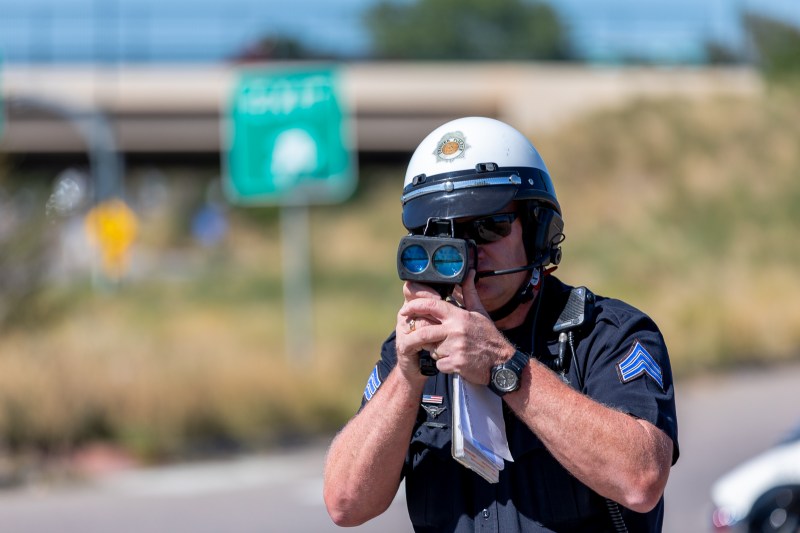Denver Police Hire 9 Officers to Boost Safety by Enforcing Traffic Laws


Drivers may want to slow their speeds, put down their phones and drive more safely. This morning Denver Police Chief Paul Pazen stood before a row of motorcycle cops to announce that nine new officers will beef up the city’s traffic enforcement efforts.
The move aims to cut the city’s road deaths, which are increasing dramatically despite the city’s 2016 Vision Zero commitment to end all such fatalities by 2030.
“In order to reach our goal of zero traffic deaths, we need to ensure the education and enforcement side of traffic safety,” said Pazen. “So today I announce that on Sept. eighth, we added an additional nine officers to our traffic operations bureau.”
The number of traffic deaths in Denver reached 57 recently, according to this week’s Streetsblog Traffic Violence Report, which uses data from the police department. At this point last year, 42 people had died.

After the press event, the motorcycle officers moved to W. Colfax Ave. near Federal Blvd. where Sgt. Troy Zimmerman clocked drivers’ speeds with a lidar gun before dispatching officers to issue tickets.
Street safety advocates cheered the news.
“We need to do everything we can to eliminate dangerous and careless driving,” said Piep Van Heuven of the Denver Streets Partnership. “And the Denver Police Department is a key player in the Vision Zero effort.”
At the press conference, police showed a map depicting the most deadly intersections in the city. They held the event at W. Colfax Ave. and Speer Blvd. to highlight how the department will focus enforcement efforts on areas with the most fatalities and serious injuries.
“Why are we here at this intersection?” the chief asked. “We are here because Colfax has had a significant increase in S.B.I. (serious bodily injury) and fatal accidents. Speer Blvd. as well. Using data, using the maps, time of day, day of week, that is how the vast majority of these newly assigned officers will spend their time educating and enforcing safety violations.”

Lt. Rob Rock, who heads the department’s Traffic Operations Unit, described what he called the three “E”s of traffic safety: engineering, education and enforcement.
The Department of Public Works can engineer safer streets, a process that is underway but likely to take decades. The police handle education by issuing warnings and installing electronic signs with variable messages, said Rock. They can beef up enforcement of traffic laws, too.
“When these things are in balance — education, engineering and enforcement — when they’re balanced perfectly, then we get a safe traffic system,” said Rock.

Fatal crashes are avoidable, the chief said, and the department’s intensified enforcement effort is about safety, not issuing tickets.
“This is completely about traffic safety, and that’s our focus,” he said. “If folks slow down in these areas, and we don’t have to write tickets, then that’s a good thing for everyone.”
Everyone includes all road users, according to Rock, who ended the press conference by highlighting that drivers, bicyclists, pedestrians and scooter riders deserve safe streets.
“We want to make sure that anybody and everybody can get from point A to point B safely,” he said. Whether that’s in a vehicle, on a bicycle, on foot or on a scooter.”
The nine new officers graduated from the department’s academy and field training program last week, said the chief.


